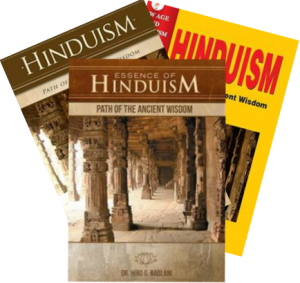By “spirituality,” Hindus mean an eternal union or connectedness with the Divine and, through the Divine, with all creation. Hindus also believe in connectedness through time, spread over eons of birth cycles. Hindu philosophy recognizes spirituality in a very special way. The unique features of Hinduism are its belief in karma (As you sow, so shall you reap), punarjanam (reincarnation), samsara (the eternal cycle of birth and death), moksha (salvation), and avtar-karan (God incarnation).
The world, according to Hindu philosophy, is like a teaching institute, or ashrama, in which one learns in various phases of one’s karma through eons of birth cycles.
Hindus believe that our present status and position are determined by our past actions (or karma). Karma, which has now become a household word in the West, is basically a form of energy. It moves in the form of thoughts, words, and actions but most potently in thoughts. Whatever good or bad we do, it will come back to us. Hindu Rishis maintain that the main purpose of life is to transform our minds toward virtue and divinity. Once we are able to transform our minds, all of our past sins and errors may be mitigated or considerably modified.
The concept of reincarnation is unique in Hinduism, as well as in religions that originated in India, such as Jainism, Buddhism, and Sikhism. Hindu philosophy also accepts that the spiritual knowledge gained in one life stays forever and does not vanish after death. Man may thus continue his journey of spiritual evolution from the stage of learning he had reached in his previous life.
After attaining the intellectual mind, the human mind has two choices: It may go downward on the path of ego, or it may go upwards on the path of divine spirituality, toward the Divine, the spiritual consciousness, or the super-consciousness, and wean itself away from the direction of personal ego. Peace (shanti) comes to the person of higher spiritual consciousness. Hindu sages have promoted peace above all else. In Hindu theology, the saint or sage (sant) is considered one who has completely annihilated his ego. Hindu theology is essentially God-centric. The spiritual masters prompt a human being to remain humble and devoted to God at all times. Continuously remembering God, while performing any actions, imparts the divine virtues to all deeds, which become free from any evil or sin. Hindu philosophy recognizes that the Divine is within all beings. The soul of an individual, the jivatma, is but a part of the divine soul, the paramatma, even though it may be in a dormant and deluded condition.
It is a common experience that when we give happiness to others, we feel happy; and when we make others unhappy, we too become unhappy. This is indeed God’s gift to man. God has made the human apparatus highly cognitive in order to perceive and feel in great depth the ultimate truth.
According to Hindu philosophy, God has given each human being, a perfect life to learn and grow. Through experience we mature out of fear into fearlessness, out of anger into love, out of conflict into peace, out of darkness into light and union with God.
Gradually, religion and spirituality became the way of life in Hindu society. Swami Vivekananda said:
“Not politics nor military power, not commercial supremacy nor mechanical genius furnishes India with that backbone, but religion; and religion alone is all that we have.” 41
Hinduism encompasses beliefs in certain unique concepts like karma (As you sow, so shall you reap), punarjanam (reincarnation), samsara (the eternal cycle of birth and death), moksha (salvation), and avtar-karan (God incarnation). These concepts which remain unrecognized by modern science, present answers to many vital questions which have forever baffled mankind: Why are some born in good fortune and others in such miserable conditions? Why some do not reap the benefits of their good work when they are still alive? What is the real purpose of life etc? According to Hindu philosophy, human birth is the most precious as it grants beings with a thinking mind. Yet, evolutionary development is not void of obstacles; human mind must overcome the hurdle of “ego”, with the help of discrimination and free will. Often, man falters and falls down while fronting this most arduous hurdle! Nonetheless, Hindu viewpoint reassures that ultimately, all souls will mature through eons of birth cycles, earning the coveted goal of moksha –salvation. One is prompted by the saints to always be on guard and pursue the path of divine virtue to progress on their paths.




